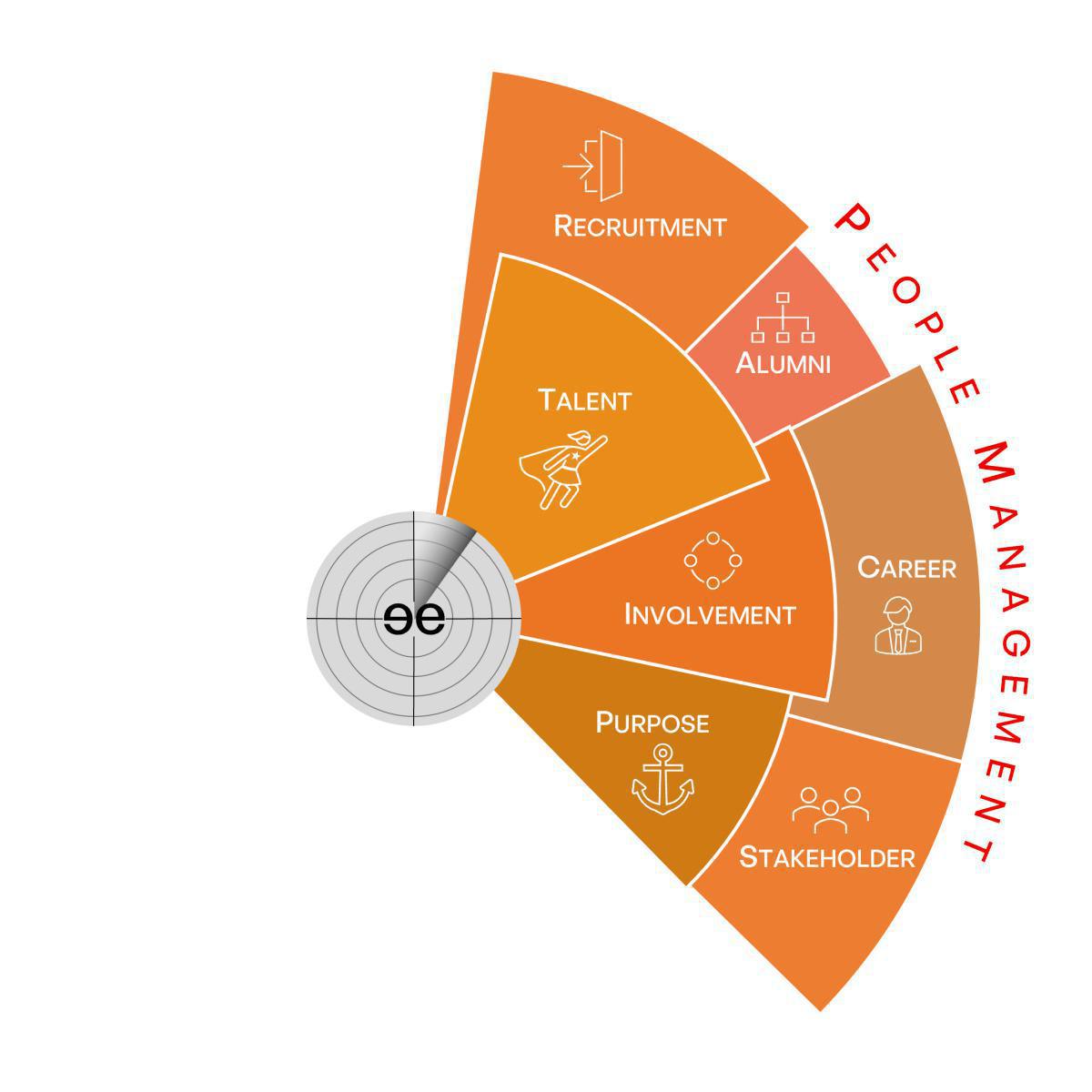Elements of Enterneering®/People/People Management
Entrepreneurs bear responsibility for their company, and the company bears responsibility for the people who work in it. The people, in turn, contribute to the success of the company through their input, knowledge, skills and, above all, personal commitment and good health. These people are the ones who establish and expand the connections to and communication with all external parties who interact more or less directly with the company.
It is therefore crystal clear that entrepreneurship is 'people business' and 'people business' is at the core of every company. |
This, the third decade of the 21st century, is a critical period for all of us across the globe. It is a moment of truth for all enterprises. And, as entrepreneurs or intrapreneurs, we are being challenged as we have never been challenged before. Disruptive changes are reshaping the environment.
It is obvious that many leaders still think that business revolves only around technology, sales, manufacturing processes or the supply chain. This narrow view will not lead to sustainable success. Successful companies revolve around human needs and the need to employ the right people.
To be successful, entrepreneurs must be as familiar with and knowledgeable about the latest trends and fads in modern HR work as they are with basic HR tools. Many of the trends that were popular ten years ago are no longer relevant today, and today's top tools will probably face the same fate in future. Essentially, there is a consistent basic framework, the individual parts of which continue to develop, and which is constantly augmented by new elements. Unilateral action will not lead to success in the medium-to-long term. Trendy tools alone will not help companies succeed if they fail to understand and classify basic human needs, behaviour patterns and patterns of social cooperation. Companies that rely predominantly on tried-and-tested methods and continue to maintain cultural, systemic and organisational components with no expectation of meaningful further development are also probably doomed to fail.
It is not necessary for entrepreneurs to master all the individual HR fields and their characteristics in detail. And, of course, they should not allow themselves to get bogged down with daily personnel tasks. Their own preferences or strengths should never be in the foreground when it comes to decisions about the direction of the HR department. But they need a good toolkit for controlling, applying and developing their way of thinking and behaving. And they need to be able to assign the right people to carry out the company’s HR tasks, as well as manage them and appropriately assess their recommendations or decision proposals.
Finally, entrepreneurs need to know the difference between people management as a process within the operational organism and leadership as a managerial function. Those with this managerial function have an influence on how people management is implemented, but this is different from the tasks and methods of people management as a corporate function.
The purpose of people management is to attract the best possible people to the company, help them grow and develop within the company and retain them. The aim is to enable the people who work in or with the company to optimally perform and collaborate, motivate them and help them maintain their health.
Elements in people management
PURPOSE
Having a meaningful purpose is key to staying focussed on the things that matter the most. It helps in setting priorities and avoiding activities that do not serve the purpose. Employees will be most committed to their work when the company’s purpose is meaningful to them too, and they feel as though they are contributing to the greater good.
INVOLVEMENT
A key factor for success is the participation of staff in strategy and business activities, as well as in management and decision-making. It gives employees a sense of belonging in the company, which, in turn, makes them more reliable. They accept greater responsibility for their work and achieve better results.
STAKEHOLDER
If a company does not know its stakeholders and understand their needs, it will not be able to actively manage business-relevant areas. Besides employees, this could include anyone with whom a company communicates or associates, such as customers, local community members, government officials, investors, competitors or anyone else who interacts with the company.
TALENT
An important task of an entrepreneur is to create conditions that ensure that the right people with the appropriate skills are entrusted with tasks in which they can achieve the greatest possible success for the company and themselves. This calls for awareness, intuition and consistency on the part of the entrepreneur.
CAREER
At first glance, the topic of career seems to be very personal to each employee. However, companies that consciously address career planning and the ongoing development of their employees can better develop talent and put it to use more effectively, helping them avoid demotivation and undesirable employee turnover.
RECRUITMENT
Successful recruitment is the result of professional interaction among all individuals involved in the process. This is an important, sensitive and highly individualised process, so it is essential to have the necessary awareness and properly set priorities. Entrepreneurs must ensure that this interaction runs smoothly.
ALUMNI
Corporate alumni can enhance employee loyalty, reduce employee turnover and retain talent by leveraging the power of a network of past and present employees. Past employees may become customers, apart from delivering benefits in the form of new hires, referrals, marketers, lobbyists, investors, suppliers and many others.
Related content:
- Elements of Enterneering/People/Purpose ❭ ❭ ❭
- Elements of Enterneering/People/Involvement ❭ ❭ ❭
- Elements of Enterneering/People/Stakeholder ❭ ❭ ❭
- Elements of Enterneering/People/Talent ❭ ❭ ❭
- Elements of Enterneering/People/Career ❭ ❭ ❭
- Elements of Enterneering/People/Recruitment ❭ ❭ ❭
- Elements of Enterneering/People/Alumni ❭ ❭ ❭



